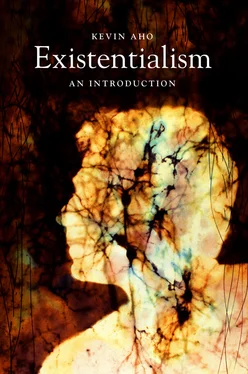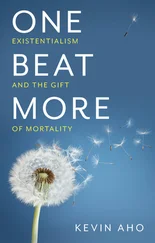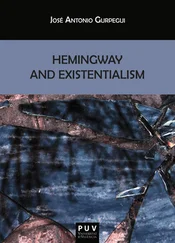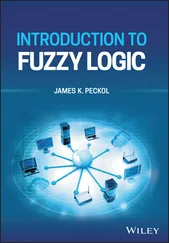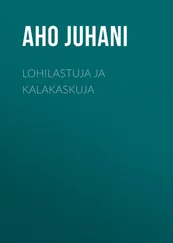This means, of course, that our inveterate tendency to conform, our ‘herd nature,’ is also an instinct, the result of a unique evolutionary unfolding, where we have, over tens of thousands of years, developed shared languages, beliefs, and communicative practices that are useful for our collective survival as the “most endangered animal” (1995, 354). Consciousness, on this view, does not refer to a self-directed mind that is the center of my thoughts and actions. It is, rather, a social and linguistic construction. “[Consciousness] is only a means of communication,” says Nietzsche; “it is evolved through social intercourse and with a view to the interests of social intercourse” (1968, 524). Seen in this light, my inner intentions, beliefs, and desires are already shaped in advance by the shared historical context that I have grown into unawares. It is this context that makes it possible for me to understand the world and make sense of my thoughts and actions. This is why Nietzsche suggests that “consciousness does not really belong to the individual existence of human beings, but rather to the social and herd nature in them; that, as a consequence, consciousness is subtly developed only in regard to social and herd usefulness” (1995, 354).
But simply because he rejects the notion of an autonomous mind or consciousness and regards “the body and physiology [as the] starting point” (1968, 492) of his philosophy does not mean that Nietzsche is a determinist who embraces a mechanistic account of human behavior. He makes it clear that human existence cannot be reduced to the law-like principles of Newtonian science. Indeed, Nietzsche sounds like Dostoevsky's underground man when he writes, “Do we really want to permit existence to be degraded for us like this — reduced to a mere exercise on a calculator and an indoor diversion for mathematicians?” If we did this, would we not “divest existence of its rich ambiguity ” (1995, 373)? In this sense, Nietzsche is neither an advocate of freedom nor of determinism because there is no faculty (the ‘mind’ or ‘will’) or determinist calculus that can sustain the philosophical debate. They are both historical fictions that emerged out of our instinctual need to explain and simplify a reality that is irreducibly complex and ambiguous. This explains why Nietzsche says, “Freedom of the will or not freedom? — There is no such thing as ‘will’; it is only a simplifying conception of understanding, as is ‘matter’ ” (1968, 671; cited in Schacht 1983, 304).
Nietzsche is not denying that we, like all other creatures, act according to our natures, but that we are compelled to act on the basis of a multiplicity of forces and drives that we are not (and can never be) fully conscious of. But this does not make Nietzsche an ‘instinctualist’ when it comes to the question of human freedom. Such a view would reduce freedom to what he calls “ laisser aller ,” where we simply “let go” and “give in” (1990, IX, 41) to our animal instincts and act impulsively without any evaluative reflection (Schacht 1983, 307; Solomon 2002, 80). This creates an overly narrow and ‘decadent’ picture of human agency, where freedom would be equivalent to blindly submitting to whatever feeling or impulse that we had at a given moment. As we saw in our discussion of selfhood in chapter 4, a person cannot be reduced to a ‘wanton’ who acts impulsively on the basis of whatever causal stimulation is strongest. Nietzsche sees humans as occupying a “higher stage” (1968, 928) of evolutionary development because we can evaluate, control, and even overcome our impulses. This means we are free when we do not reflexively submit to our strongest desires or to dominant social conventions. Unlike other animals, we have what Nietzsche calls “the capacity for long-range decisions” (1998, VI, 212). We are capable of envisioning the kind of life we want to live and the kind of person we want to become and create ourselves on the basis of that vision.It is true that we cannot escape the limitations of our animal nature or the habits and prejudices of our tradition, but we can resist and struggle with them insofar as they prevent us from realizing the kind of person we want to be. Indeed, for Nietzsche, freedom is nothing other than the painful exertion and struggle that we endure in the process of making ourselves who we are. This is why Nietzsche refers to the human being as both “ creature and creator ” (225).
Robert Solomon (2002) explains this view by drawing on the distinction between ‘first-order’ and ‘second-order’ desires that we discussed earlier. As a gambler, for example, I may have a strong first-order desire to spend my weekly paycheck at the local casino for the sake of immediate gratification. But this creaturely impulse can be overcome by a higher, second-order volition to be a responsible father and provider for my family. Acting on the basis of this second-order desire and exercising control and restraint regarding my impulses reveals my unique capacity as a creator, embodying what Nietzsche calls “self-direction” (1968, 705), to envision a particular kind of life and to act on the basis of that vision (Schacht 1983, 307). Being a creator in this way makes me responsible for the person that I become insofar as I act on these higher aspirations. However, Nietzsche makes it clear that this capacity for transcendence and self-mastery is not absolute. Because I am nothing more than the ‘totality of drives that constitute my being,’ my capacity for transcendence is always mediated by the unique confluence of creaturely strengths and weaknesses that I am born with and that I inherit from my history. In this sense, Nietzsche is presenting a version of what we have been calling ‘situated freedom,’ arguing that the capacity for transcendence that I possess is always conditioned by the complex unity of physiological and historical forces that constitute who I am. Thus, when Nietzsche refers to “the highest types of free men [in whom] the highest resistance is constantly overcome” (1990, IX, 38), he is not referring to capacities that all human beings share. “Only a very few people can be independent,” says Nietzsche. “It is a prerogative of the strong” (1998, II, 29). The measure of freedom that I am capable of is the result of the “fortunate organization [of my nature]” (1968, 705). Indeed, most of us will be incapable of genuine self-creation. This is why Nietzsche says freedom is “for the very few” (1998, II, 29). It is reserved only for the highest type of human being who cannot help but struggle and fight to become who they are.
The conception of freedom as the struggle to create oneself in the face of factical limitations and constraints leads to another core idea in existentialism, authenticity . The existentialists recognize that everyday life is usually characterized by being inauthentic, that is, we deceive ourselves by conforming to the ready-made roles, meanings, and values of the public world and, therefore, refuse to take responsibility for our own being. Existentialists offer an alternative to this kind of self-deception by addressing what it means to ‘ be true ’ to oneself. Consistent with the existentialist conceptions of freedom and selfhood, authenticity is not given to us by some pre-given essence; it is something we earn or realize through our actions and choices. In the following chapter, we will examine the ways in which existentialists offer different views of self-realization and articulate how these views can lead to the criticism that, in privileging authenticity, existentialism may be undermining the possibility for ethics.
Suggested reading
Arp, K. (2001). The bonds of freedom: Simone de Beauvoir's existentialist ethics . Chicago: Open Court.
Читать дальше
